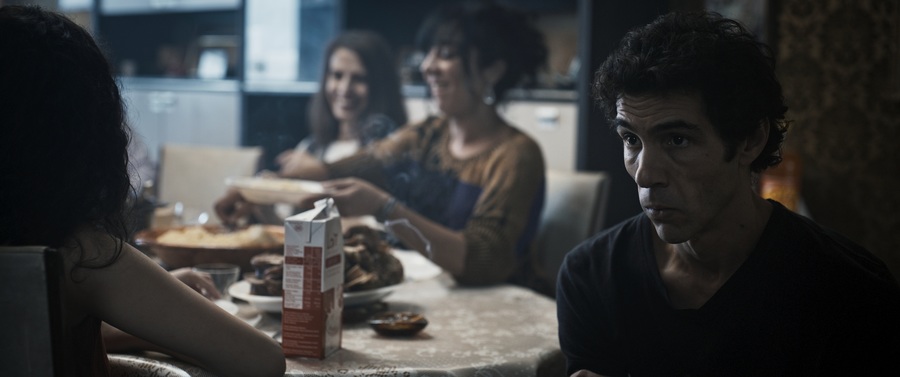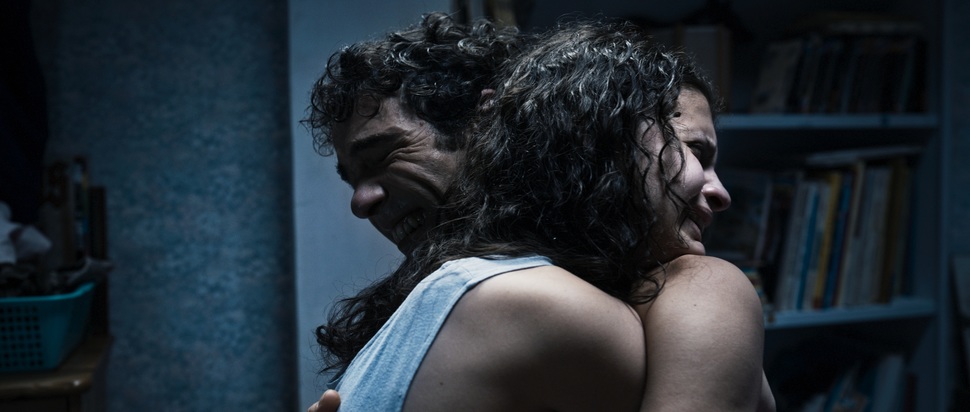Julia Ducournau and Tahar Rahim on Alpha
Julia Ducournau's latest film Alpha tells the story of a mysterious pandemic of the 80s and 90s – just don't call it an AIDS analogy, and certainly don't assume it's about alpha males. Ducournau and actor Tahar Rahim tell us more
Midway through a long, thoughtful answer about finding beauty and humanity from within the ashes of tragedy, Julia Ducournau takes a moment to chuckle. "I remain very optimistic in many ways, even if my world is pretty dark," she says. Our conversation is specifically about her new film, Alpha, but the idea of forging tender connections in spite of, or even directly through, traumatising circumstances recurs throughout her previous features. Those hurdles range from an inherited taste for human flesh (Raw from 2016) to the overwhelming discomfort of being trapped within one's own vulnerable, fallible body (the Palme d'Or-winning Titane from 2021).
If Raw and Titane could be classed as body horrors, Alpha is more a drama about societal response to finding bodies terrifying. Split across two timelines (one set in the 1980s, the other the 90s), Ducournau's latest follows one family's experiences with a virus wreaking havoc upon the French population, as well as the resulting epidemic of fear around victims and suspected carriers. Given the chosen time periods, you've likely already guessed which real-life epidemic may have influenced the film. But Ducournau is adamant that Alpha is not a story about AIDS, especially since the symptoms of her created disease have a distinctly fantastical element: the skin of those infected slowly turns to marble.
The writer/director decided on this physical symptom early on. "It goes with what I wanted to do with my vision for this particular story," she tells me at the London Film Festival. "At no point did I expect to make a movie directly about AIDS. If I had done a movie directly about AIDS, I would obviously have treated the symptoms differently; I would have named the disease, and I probably would have done a way more historically accurate film than what this is.
"The main disease that spreads in the film is fear. And I'm trying to study and dissect how fear works and how it can lead to rejection and hate, even as far as a young girl is concerned. I'm thinking, if it shocks you that a young girl is treated in such a way, why doesn't it shock you in real life when it happens to real people?"

That young girl is the eponymous Alpha (Mélissa Boros), who's 13 years old in the 90s timeline. She's suspected of catching the virus when she stumbles out of a party with a new stick-and-poke tattoo of unknown origin, the arm art's frequent bleeding prompting disgust and rejection among her schoolmates. Making matters stranger is the arrival of an uncle, Amin (Tahar Rahim), whom she doesn't remember, coming to stay at the apartment she shares with her mother (Golshifteh Farahani), a doctor who predominantly treats increasingly statue-like infected patients.
"Marble is a very noble material," Ducournau says. "It’s used to sanctify saints and kings in cathedrals and churches. It’s very much linked to the sacred. I wanted to implement this sacred within the lives and deaths of the people affected; to somehow elevate the lives and deaths in the eyes of society and to build a dignified monument to them, when they were actually in their lives treated like pariahs and marginalised. Also, this image of the coexistence of a non-mutable, hence dead material, such as stone, with flesh, which is a very lively material that's pumped up by blood and constantly moving, was a very uncanny vision that I thought was the closest way that I could express our mortal condition, and our fear of mortality, visually speaking."
One person who got a direct taste of the uncanny designs first-hand – realised through silicone prosthetics with stone-like rigidity added through CGI – was Tahar Rahim, though the actor also underwent a considerable physical transformation before the shoot to play someone already emaciated through drug addiction, even before the mysterious virus changes his body. "When you have to play someone who's suffering from addiction like Amin at this level," he tells me, "physically you have to match. There's no other way. Otherwise, I would've ruined the movie from the inside out." And from the sound of things, sabotage was not on his agenda, having wanted to work with Ducournau ever since seeing Raw. Rahim also did his homework, volunteering at a facility that helps people suffering with addiction, where he assisted with operations to drive through Paris to addicts' gathering spots and administering sterile supplies "to do what they have to do."
Away from Amin and back to Alpha, Ducournau tells me that the idea for the character's name came before settling on the film's title. "But it's so funny because a lot of people thought it was a movie about alpha males," she says with a laugh. "What the hell?! Thank God there are no alpha males in my film. And since when is it so ingrained in our brains that the word ‘alpha’ belongs to alpha males? I'm sorry, but no! I'm reclaiming it a hundred percent."
Alpha is released 14 Nov by Curzon, and screens as part of the 33rd French Film Festival UK. More details at frenchfilmfestival.org.uk
